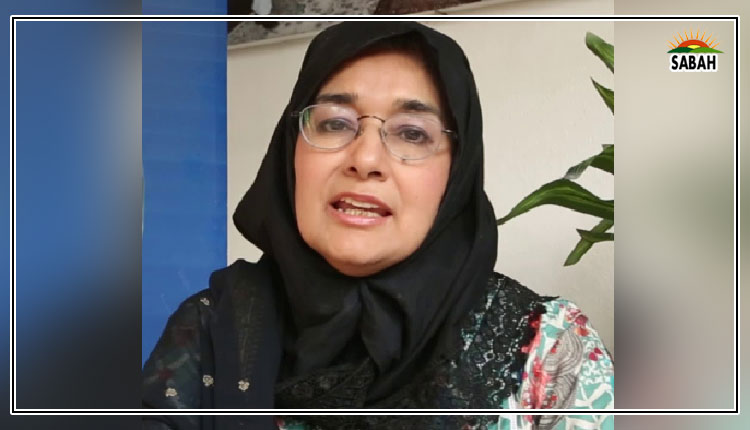Serious focus needed to fight growing mental diseases: Dr. Fowzia Siddiqui
KARACHI, July 22 (SABAH): Noted neurophysician of the country Dr. Fowzia Siddiqui of Aga Khan University Hospital Karachi, who is also President of Epilepsy Foundation Pakistan has stressed the need of a serious focus of government and society to fight growing cases of mental illness in the country. On the occasion of World Brain Day of World Federation of Neurology, Dr. Fowzia Siddiqui said that the human brain is very complex and so are the brain diseases. She said there is a greater need if spreading awareness about the brain diseases so that their timely diagnosis and treatment could be ensured. She said even a minor problem in brain could affect the whole body. A tiny clot in brain could result in paralysis of whole body.
She said that there are different symptoms of different brain diseases and people should immediately consult a trained neurologist or psychiatrist in case of any complaint. She asked the government and all stakeholders to raise awareness about the brain diseases so as to prompt a healthy society in Pakistan. It may be noted that the World Federation of Neurology annually celebrates World Brain Day on July 22, to raise awareness of neurological disorders and promote brain health worldwide.
Data from the Global Burden of Disease Study 2021 shows that not only are neurological conditions the main cause of disability worldwide, surpassing previous estimates, but also that a new and expanded spectrum of neurological conditions are involved. This new discovery necessitates a comprehensive approach to brain health, with prevention as a key strategy to mitigate the impact of these neurological conditions.
The World Brain Day 2024 focus is brain health and prevention, aligning with WHO brain health initiatives and the Intersectoral Global Action Plan on Epilepsy and Other Neurological Disorders (IGAP). The joint focus of all six World Federation of Neurology regions on prevention highlights the opportunity for and underscores the pivotal role of prevention, proactive care, and risk mitigation in reducing the enormous impact of neurological diseases, now the leading cause of disability globally.
Importantly, prevention encompasses primary and secondary prevention as well as health promotion.
Primary prevention includes risk assessment, management of active risk factors, and longitudinal monitoring and surveillance for prodromal signs and symptoms.
Secondary prevention involves early and prompt diagnosis, risk factor reduction, active treatment intervention, and optimization of lifestyle factors and behavioral health. Health promotion strategies, such as Life’s Essential 8 stroke prevention strategies, are crucial for optimizing health outcomes.
Illustrative examples of prevention strategies include several historical infectious diseases (eg, polio), for which vaccination has been successfully implemented, and, more recently, stroke, for which efforts to control blood pressure and risk factors have produced a positive effect on outcomes worldwide. WHO continues to have a pivotal role and will participate as a guest of honor in World Brain Day 2024, highlighting the significance of the event in moving closer to the benchmarks of the IGAP. The World Federation of Neurology encourages countries worldwide to participate in World Brain Day 2024 with renewed interest and vigor and to engage in local activities aimed at promoting brain health and prevention of brain injury and disease. By fostering global collaboration and advocacy efforts, World Brain Day 2024 serves as a catalyst for advancing better brain health for everyone.












